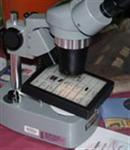 STUDY AT HOME -- HORTICULTURE
STUDY AT HOME -- HORTICULTURE
- study at your own pace; wherever and whenever suits you
- equal to 3 years full time study
- compare: this course is more substantial than some degrees
ACS Student Comment: "I have found the course to be interesting and challenging, with great learning materials that really make you research the industry and get involved. It has been a great way to study because it has allowed me to work in the industry and study at the same time. I have found the online resources to be fantastic, the tutors feedback constructive and the fact that assignments can be submitted online makes the process so easy." Tom Wood, Australia - Learning bundle in Horticultural Science course.
Opportunities are Exceptional
Horticulture has changed dramatically in recent decades and will no doubt continue to change rapidly; but there will always remain a need for horticulturalists while we continue to eat fruit and vegetables, play sport and use tree planting to improve the environment in which we live.
Horticultural Technicians and Scientists need to have a strong foundation in both horticulture and science. They need to know how to identify lots of different plants, and the botany and chemistry that underpins an understanding of how to grow those plants .
Whatever is in vogue at different times throughout your career, this course will prepare you to move into and adapt to working in that part of the industry.
 How Does this Differ to Horticulture Studies elsewhere?
How Does this Differ to Horticulture Studies elsewhere?
Here's a comment from one of our students who had previously completed a uni degree:
"The main difference between my experience of studying at University and studying with ACS is that at University you're basically regurgitating text books. In contrast ACS assignments can be quite involved requiring hands-on application of principles, creative thinking and analysis." Dennis
- At ACS we believe good education must focus on learning
- It must change who you are, and what you can do
- It must be more than just accumulating and remembering information (after all, a good book does that!)
- More opportunities to specialize and distinguish yourself from the competition
- We know that employers seek people who can perform, solve problems, communicate, show empathy with others, grow and remain passionate about their work. .... we work hard at helping you to be better in all these ways
Prerequisites:
Either Year 12 (passed), an acceptable certificate (eg. Completed apprenticeship), over 18 yrs of age.
 Stage 1 Core Studies
Stage 1 Core Studies
The following six modules are undertaken first as a foundation for further studies (more details below):
- Horticulture I
- Horticulture II
- Horticulture III
- Plant Selection and Establishment
- Botany I
- Biochemistry I
Note: Modules from either stages II & III may be undertaken after stage I is complete.
Stage II Electives
Ten modules chosen from the following:
- Plant Ecology
- Soil Science
- Organic Plant Culture
- Permaculture Systems
- Outdoor Plant Production
- Garden Maintenance
- Trees for Rehabilitation
- Landscaping I, II, III
- Propagation I
- Hydroponics I
- Protected Plant Production
- Viticulture
- Herb Culture
- Biochemistry III
- Turf Care
- Turf Grasses
Other options may be added over time.
 Stage III Compulsory Modules
Stage III Compulsory Modules
The following should all be completed
- Cell Biology
- Biochemistry II
- Horticultural Research I
- Horticultural Research II
- Industry Meetings or Workshop I (Note: This can be completed without difficulty anywhere in the world).
OUTLINES OF KEY CORE MODULES
Horticulture I
There are twelve lessons as follows:
1. Plant Identification
2. Planting
3. Soils
4. Nutrition
5. Water Management
6. Pruning
7. Weeds
8. Pests and Diseases
9. Landscaping
10. Propagation
11. Lawns
12. Arboriculture
Horticulture II
There are ten lessons as follows:
1. The Groups of Plants
2. Use of Plants
3. Australian Native Plants
4. Exotic Ornamental Plants
5. Indoor & Tropical Plants
6. Bedding Plants
7. Vegetables
8. Fruits, Nuts & Berries
9. Herbs
10. Alternative Growing Techniques
Horticulture III (Plant Health)
There are ten lessons as follows:
- Introduction
- Overview of Preventative Controls
- Insecticides
- Other Pesticides
- Spray Equipment
- Insect Biology
- Fungal Biology
- Environmental Problems
- Viruses
- Nematodes, Molluscs and Crustaceans
Plant Selection & Establishment
There are ten lessons in this as follows:
- Introduction What to plant where, Plant selection, Plant varieties, Colourful year round foliage, Establishment (timing, soil preparation, plant size, planting technique), Maintenance programs, etc
- Woody plants
- Windbreaks, hedges and screens
- Alpine and water plants
- Annual and herbaceous plants
- Turf
- Maintenance
- Pest and disease control
- Weed control
- Risk assessment
Botany I
The course is divided into 10 lessons as shown below:
- Taxonomic Classification of Plants
- Cells and Tissues
- Specific Vegetative Parts of a Plant
- Flowers and Fruit
- Seed and the Developing Embryo
- Photosynthesis and Growing Plants
- Respiration
- The Role of Water
- Movement of Water and Assimilates through a Plant
- The Effects of Tropisms and Other Growth Movements
Biochemistry I
There are 9 lessons as follows:
- Introduction
- Lipids and proteins
- Enzymes
- Nitrogen and the nitrogen cycle
- Photosynthesis and respiration
- Assimilation and transpiration
- Acidity and alkalinity
- Chemical analysis
- Biochemical applications
Other module outlines can be found on this web site -or email for details.
Duration: 2100 hours
Course Manager
 This course has been designed, and is managed by John Mason, our principal. Since graduating in horticultural science (1971), John has worked as a landscape designer, nurseryman, parks manager and research officer working with field crops, prior to establishing this school in 1979. Since then, apart from managing this school he has been editor of four national gardening magazines, written over 40 books and maintained a small practice as a horticultural consultant.
This course has been designed, and is managed by John Mason, our principal. Since graduating in horticultural science (1971), John has worked as a landscape designer, nurseryman, parks manager and research officer working with field crops, prior to establishing this school in 1979. Since then, apart from managing this school he has been editor of four national gardening magazines, written over 40 books and maintained a small practice as a horticultural consultant.
John has been made a fellow of the Institute of Horticulture (UK) and the Parks and Leisure Institute (Australia).
Tutors
All teaching staff are highly qualified and experienced professional horticulturists. Most hold both degrees an post graduate qualifications. On average, their industry experience exceeds 20 years.
A unique aspect of this course (and others through ACS) is that tutors and course developers come from both northern and southern hemispheres, and from both warm and cool climates. The content and delivery of the course aims to prepare you to work in any climate, country or social situation. We consider this aim to be exceedingly important in a world that is changing so rapidly. We aim to provide a foundation that will serve you wherever you find yourself in the future.
HOW WILL THIS COURSE HELP TO TO GET A JOB OR PROMOTION?
Will doing a course get me work? No not always! Many people study just to get a qualification and having a qualification may be no guarantee for work. What will get you work, especially for a 2100 hour level student where you are obviously studying to advance your career, is studying the right subjects and retaining, but more importantly being able to recall and apply your knowledge and skills later (even years later). Not all courses set you up for this – some people are rushed through courses, rather than studying at a self-paced speed, they need to fit in with course deadlines. This makes people rush and rushing does not allow you to truly absorb information – lack of absorption means an inability to recall and apply knowledge. What you learn from a good course does greatly increase your employment opportunities.
What do I need to Get Work in Horticultural Science?
Sound demonstrable knowledge and skills across horticulture industry sectors but also pertinent to the job; a qualification is just one part of that, many people have qualifications but it is how you are able to apply and demonstrate your knowledge that will count most to your potential employer. In plant science you will not only know the basics of horticulture such as plant identification, plant culture, soil management, propagation and so on you will also need to have a sound grounding in botany, plant pathology, plant breeding etc.
- Good communication skills:verbal, written and IT skills are the very basis of a professional in any industry and horticulture is no exception. You need to be able to communicate effectively at all levels – with workers, your peers, your employers and importantly your clients.
- Problem solving skills: In the work place, and as a professional, you will need to problem solve all the time – you need to be able to think on your feet, come up with quick solutions and make sure that those solutions are carried through and actually work. Problem solving skills are encouraged in ACS courses because your set tasks and assignment are based on Problem Based Learning – a system which is proven to produce graduates that have advanced problem solving capabilities and there is nothing an employer likes more!
- Efficiency: Efficient workers know how to plan, organise, have logic and be able to apply it to work load and production (doing the things in the right order in an organised way). Efficient people don’t need to do this quickly they should be adept at applying skills and expertise.
- Professional attitude: employers prefer people with good personal presentation and the ability to work cooperatively within a team environment.
- A passion for the industry: Employers also prefer those that show a passion for their work and you can demonstrate this by being across the latest developments pertinent to your industry sector, you can do this through networking within industry; volunteering to get experience, memberships to clubs, societies, associations; reading literature all help you gain a good profile and make you stand out from others applying for the same positions.
What Can You do to Improve Your Career Prospects?
- Make sure you are studying to gain knowledge, experience and skills rather than just doing it to get the ‘piece of paper’. See study as a first step – continue studying and learning throughout your professional life, keep up with technology and be passionate about your work. Read, attend conferences, check the news in your industry, read industry papers, network and so on.
- Never learn from one source – use all that you can and from a diverse range of sources – textbooks, internet sources such as universities and other respected sites, through industry conferences and through networking. By learning from many sources it opens up your mind and also gives you a more diverse perspective on what you are studying.
- Make sure your C.V. is well written and presented and set out to current preferences –get help if you need it (tutors at this school will help our students with their C.V.'s if you ask - no cost. Resume writing services can also be used, but they charge).
- Recognise your weaknesses, and work on improving them - not just academically. Know your strengths and don’t be afraid to show it!